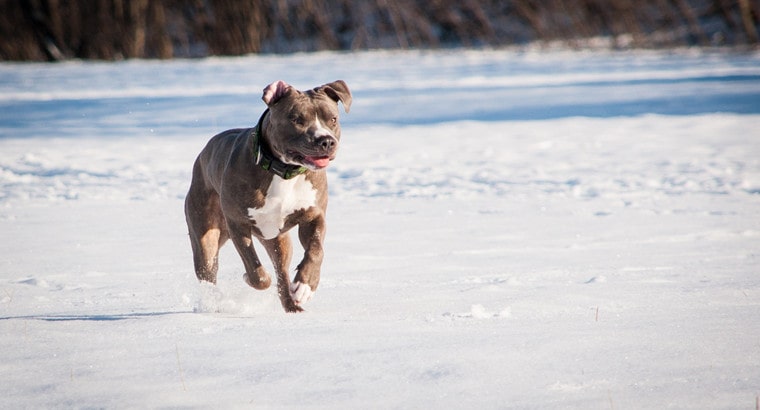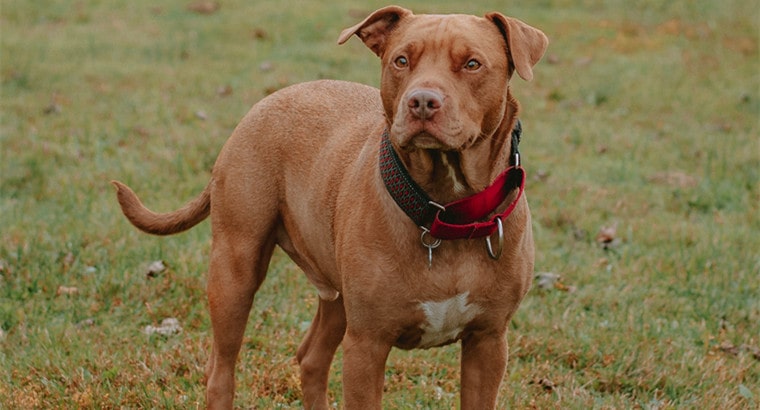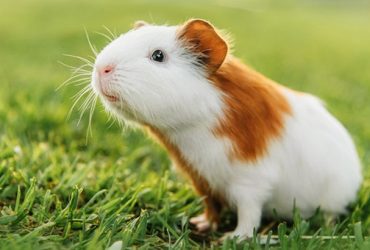There are a lot of factors that determine a dog’s life expectancy. Many dogs have a short life, while others live for a much longer time. In the case of Pitbulls, their lifespans depend majorly on their genetic traits and how you’re taking care of them.
Educating yourself about how to properly care for and maintain your Pitbull’s health can go a long way in keeping your pup happy and healthy. Here’s what you should know about Pitbull lifespan.
What Is a Pitbull?
A Pitbull is not one particular breed of canine. It is more of a general term to refer to a hound. Four canine breeds come under the umbrella of the category Pitbull. They include the American Bully, the American Pitbull Terrier, the Staffordshire Bull Terrier, and the American Staffordshire Terrier.
All Pitbull dogs do not necessarily have to share a similar genetic pool. Many dogs categorized as Pitbulls because of their physical appearance are not even genetically related.
Pitbulls have had a bad reputation of being too aggressive and not safe to be around. But that couldn’t be farther from the truth. Pitbulls can be the sweetest and most loyal dogs.
Many communities and rentals have even banned these sweet puppers from living in their areas. Thankfully, many pet activists are trying hard to clear these dogs’ reputations and show them for the sweet pups that they are.
What Is a Pitbull’s Lifespan?

It’s natural for any pet owner to want to have their furry companion around for a long, long time. In which case, you need to know everything about your dog and how to give it the best care possible. One of the aspects you need to focus on is your Pitbull’s life expectancy.
Pitbull’s Lifespan on an Average
On average, Pitbulls live for around eight to fifteen years. The average range is subjected to the condition that these dogs do not suffer from any health conditions and are provided the highest quality care.
The Lifespan of Different Pitbull Types
The American Pitbull Terrier lives for around 8-15 years, American Staffordshire Terrier for around 12-16 years, the American Bully for 8-13 years, and the Staffordshire Bull Terrier 12-14 years.
8 Factors That Impact a Pitbull’s Lifespan

There is a wide range of factors that determine a Pitbull’s lifespan. Here are some that make the most impact.
#1. Genetic Traits and Overall Health
Pitbulls can suffer from genetic conditions or acquire infections from anywhere on the streets. Dogs can also suffer from serious diseases such as cancer that can significantly reduce their life expectancy. A balanced diet, regular health checkups, and consistent care are necessities to ensure the fundamental care of your pet.
#2. Indoor And Outdoor Pitbulls
Indoor and outdoor dogs have their own set of pros and cons. Indoor Pitbulls get less exercise than the ones living on the streets. Because of this, they are more likely to suffer from obesity and subsequent health problems.
However, outdoor Pitbulls are more prone to road traffic accidents, abuse, and infectious diseases. Generally, indoor Pitbulls live longer than outdoor ones because of the lower risk of accidents and the consistent nutrition and health care they receive at their homes.
#3. Gender of the Pitbull
Unspayed female Pitbulls live longer than unneutered male Pitbulls. This disparity can be attributed to chances of trauma, aging processes, and hormonal factors. However, this does not apply to spayed or neutered Pitbulls.
#4. Nutrition
Pitbulls that receive balanced nutrition live longer than dogs that are not provided with a healthy diet. A common misconception is that all packaged commercial foods are healthy and balanced, which is not the case.
It’s best to consult your vet and discuss which branded or home foods are best suited for your Pitbull. You also need to know how much food you should be feeding your Pitbull daily. Look out for signs of overeating and weight gain and take appropriate measures to rectify the problem.
#5. Spaying or Neutering
With spayed or neutered Pitbulls, there is no surge of hormones that is seen in unspayed/unneutered dogs. Hence, spayed female Pitbulls do not suffer from ovarian and uterine cancer. They also have a decreased chance of developing mammary cancer. Likewise, neutered male Pitbulls do not suffer from testicular cancers.
Pitbulls that are not spayed/neutered are also more likely to roam around when they are in heat, exposing them to higher risks of road traffic accidents and other trauma. They can also acquire infectious diseases on the streets.
#6. Weight and Exercise
Pitbulls that lead a sedentary lifestyle tend to be obese, which can lead to a host of health conditions like cardiovascular diseases or bone and joint diseases. Underweight Pitbulls can also suffer from different diseases. Regular exercise and monitored eating habits are required to keep your Pitbull in the ideal weight range.
If you have suspicions that your Pitbull is overweight or underweight, consult your vet and come up with the right dietary chart and exercise schedules to follow.
#7. Size of Your Pitbull
Pitbulls that are smaller in size generally live longer than those that are bigger. Smaller dogs run faster, are more active, and tend to be healthier than larger, bulkier Pitbulls.
#8. Health Care
Pitbulls that receive regular healthcare live longer than the ones that do not, for obvious reasons. Vets will be able to diagnose conditions early and provide the necessary treatment. They will also help prevent many diseases that your Pitbull could develop.
What Do Pitbulls Usually Die from?

Generally, Pitbulls have an athletic build, a good genetic pool, and a strong immune system. However, they too are susceptible to chronic illnesses and infectious diseases. Here is a list of the most common reasons why Pitbulls die.
#1. Trauma
Pitbulls can be aggressive and protective. This leads them to fight with bigger dogs and hurt themselves. Because of their love for being outdoors, they can also die from road traffic accidents and, in rare cases, human abuse.
#2. Heart Diseases
Arrhythmias, aortic stenosis, and valve malformations are often observed in Pitbulls. Obesity can also lead to heart conditions. Symptoms for these conditions do not show up early, so regular visits to the vet are necessary to get an early diagnosis.
#3. Skin Diseases
Skin diseases include curable allergies to fatal melanomas and mast cell tumors. They can also eventually lead to sepsis.
#4. Gastric Dilatation Volvulus
In this condition, your Pitbull’s stomach gets twisted. It can either lead to mere discomfort or severe pain and death.
How To Increase Your Pitbull’s Lifespan

Preventive measures are always recommended to avoid emergencies and having to see your Pitbull sick. Here are some initiatives you can take to increase your Pitbull lifespan.
#1. Choose Your Pitbull Breeder Carefully
Choose a qualified breeder who offers all health clearances and the pedigree chart of your Pitbull. Steer away from breeders who refuse to provide any documents regarding the Pitbull’s parents.
#2. Keep Your Pitbull in a Healthy Weight Range
Monitor the quantity of food your Pitbull eats. Be sure not to over or underfeed your dog. Also, ensure that your Pitbull gets adequate, regular exercise outdoors.
#3. Get Regular Vet Care
Regular visits to the vet are mandatory. Vets will diagnose and treat any health issues earlier as well as suggest preventive measures that can help to keep your Pitbull healthy and happy.
#4. Feed High-Quality Food
Before buying any branded dog food, check the nutrition label behind the packaging. Consult your vet about what food is best for your Pitbull.
#5. Brush Their Teeth
Pitbulls have to have their teeth brushed two to three times a week. It helps to rid the tartar and bacteria in their mouths, keeping their gums and teeth healthy.
Prolonging Your Pitbull’s Life with Wellness Checks

At the age of eight to nine years, your Pitbull is considered a senior dog. You will need to take your Pitbull for wellness checks to the vet twice or more every year. Your vet will also recommend blood work to be done for your Pitbull on an annual basis. This is for diagnosing any underlying or asymptomatic health conditions.
Early diagnosis and treatment are effective for most chronic conditions and infectious diseases.
A Few Parting Words
Although Pitbulls are known for their aggressive character, they have so much more to offer. Pitbulls are as affectionate, loving, and loyal as any other dog, and deserve to be in a loving home just like any other dog.
Too many Pitbulls end up in rescue shelters, but thankfully this is slowly changing as there is more awareness being generated about this breed.
Hopefully, you now have a better grasp of Pitbull lifespan and their overall health. If you have a Pitbull at home, follow the healthcare tips listed here to ensure a long, healthy, and happy life for your loyal companion. If you want to learn more, check calmingdog.com for more information.










